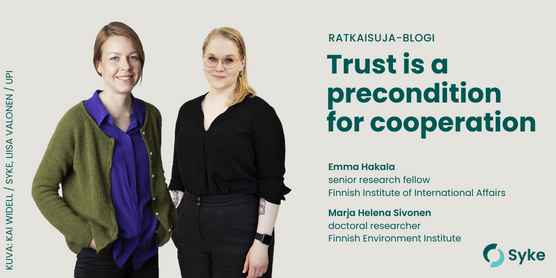
An international seminar entitled Policy implications of Arctic cross-border climate change impacts was held in Helsinki on May this year. The main emphasis was to explore how climate change impacts in the Arctic may have effects that cascade to other regions and how different actors can respond to these complex risks.
The highlight of the event was a policy simulation exercise in which participants were invited to actively engage in fictive but plausible policymaking processes. The task was to engage in co-creating policies that would reduce risk and build resilience. We think that the event raised excellent conversations and new openings for the Arctic futures.
Trust as the foundation of a resilient society
One of the core concepts discussed throughout the day was trust. It is the foundation of resilience of a society, needed in negotiations between organisations, individuals and groups. Trust is also a hallmark of ethical and robust science, it allows real dialogue beyond project-based operation leaving no one behind.
An absence or erosion of trust makes it difficult or outright impossible to address complex problems. Some possible solutions for building trust were discussed, such as openly addressing the problems, creating relationships instead of merely projects and keeping important topics alive rather than allowing their neglect to feed unjust practices and policies.
Representation and responsibility as building blocks
There is an adage attributable to various sources that “If you don't have a seat at the table, you're probably on the menu”. Comprehensive representation is especially important in the Arctic, where there are many interest groups, the stakes are high and trust between partners is yet to be built. Trust builds on seemingly mundane actions, such as asking potentially relevant partners for their input according to their interests while taking into account available resources.
The responsibility for shared decisions can be great and is often scattered, suggesting that there is a strong need for societal discussions that encourage parties to take responsibility for concrete actions.
New ways of action are needed for cooperation
Trust is also relevant in transboundary cooperation, which the current geopolitical situation has put under serious strain in the Arctic. While there is a pressing need for exchange of environmental data across national boundaries, deeper cooperation with Russia is ruled out indefinitely as long as the war in Ukraine is ongoing. Limited information is still forthcoming for serving global networks such as those used in weather forecasting. As was observed in the discussions, cooperation is not omitted, but we need to recognise new realities and seek new formats for it.
Arctic development and policy-making was likened to a ‘Rubik’s Cube’ of competing motives and sensitivities, where all elements need to be carefully adjusted to function properly, but can easily become badly misaligned through incompatible actions.*
The presentations and their practical manifestations in the policy simulation underlined how the conceptual framework developed by the EU-project Cascading climate risks: towards adaptive and resilient European societies (CASCADES) is applicable for visualising and analysing climate-related risks. Yet the conversations at the seminar also exemplified the difficulties associated with scenario planning and other foresight practices applied to such an all-encompassing and complex phenomenon as climate change.
It is perhaps no coincidence that it was particularly the younger participants of the seminar who pointed out the seeming lack of ability to integrate radical transformative change into our perceptions about the future. This may well be the message for the leaders of today: broaden your horizons and believe that fair actions based on mutual trust can create better futures.
Marja Helena Sivonen is a doctoral researcher at the Finnish Environment Institute and her PhD contributes to Tampere University. As a sociologist, she investigates power and governance in societies contributing to zero-carbon energy transitions. In her free time, she enjoys gardening and watching British murder series while cooking.
Emma Hakala is a senior research fellow at the Finnish Institute of International Affairs and postdoctoral scholar at the University of Helsinki. Her research looks at the implications of climate change on geopolitics and comprehensive security. In her free time, she likes to visit museums and walk in forests or in urban environments.
Read more
An international seminar: Policy implications of Arctic cross-border climate change impacts. Program. (cascades.eu)
Multimedia materials for the Arctic Security Simulation (engage.socialsimulations.org)
The Future of Arctic Security – policy simulation workshop (cascades.eu)
*The Rubik's Cube analogy is expanded upon in relation to security constellations in the Arctic by Gjørv (forthcoming).
The academic research presented during the event will be published via peer-reviewed journals in due time. For further readings around the topics we suggest already published works:
Carter, Timothy R., Magnus Benzie, Emanuele Campiglio, Henrik Carlsen, Stefan Fronzek, Mikael Hildén, Christopher P.O. Reyer, and Chris West. 2021. A Conceptual Framework for Cross-Border Impacts of Climate Change. Global Environmental Change, Volume 69, July. (sciencedirect.com)
Kivimaa, P., Heikkinen, M., Huttunen, S., Jaakkola, J. J. K., Juhola, S., Juntunen, S., Kaljonen, M., Käyhkö, J., Leino, M., Loivaranta T., Lundberg, P., Lähteenmäki-Uutela, A., Näkkäläjärvi, K., Sivonen, M. H., Vainio, A. 2023. Evaluation of justice in climate policy. The Finnish Climate Change Panel. Report 3/2023. (ilmastopaneeli.fi) (pdf)
Opinions of blog contributors do not necessarily reflect the official views and opinions of the Finnish Environment Institute.